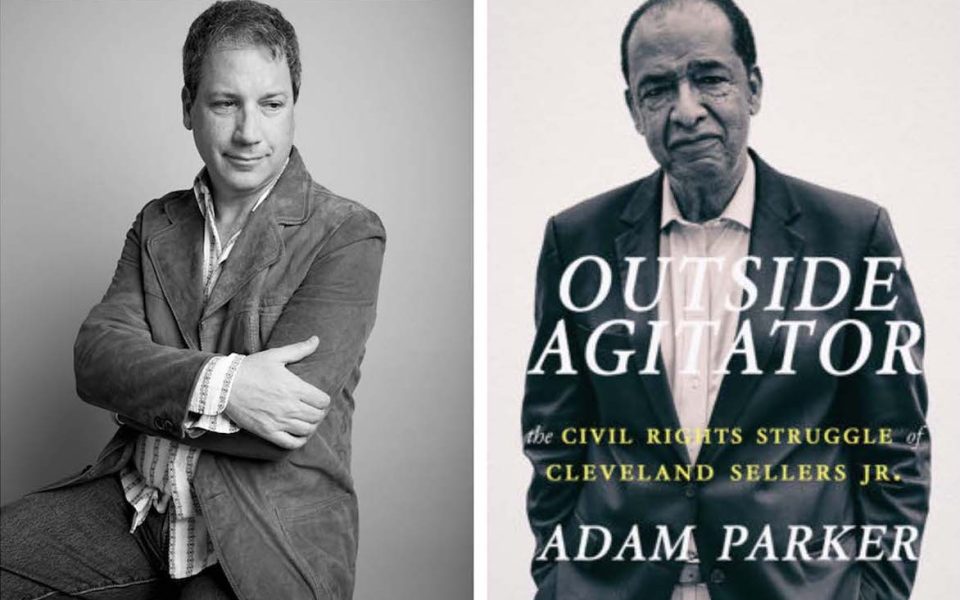Outside Agitator, with Cleveland Sellers Jr., Saturday, 11:15 a.m.;
Civil Rights: The Past and Future, with Sellers, Brian Lampkin and Robert W.
Lee, moderated by Aran Shetterly, Saturday, 2 p.m., International Civil Rights
Center & Museum
Cleveland Sellers Jr.’s name might not elicit instant recognition the way those of Martin Luther King Jr., Rosa Parks and Jesse Jackson do. Even among fellow members of the Student Non-Violent Coordinating Committee, he’s less well known than, say, Stokely Carmichael or H. Rap Brown.
But as Adam Parker’s biography — Outside Agitator: The Civil Rights Struggle of Cleveland Sellers Jr. — makes
plain, the civil rights leader and South Carolina native should be better
known: He helped mobilize Northern college students for Mississippi Freedom
Summer in 1964, while participating in a grim search for the bodies of murdered
activists Michael Schwerner, Andrew Goodman and James Chaney; led a voter
registration effort in northern Mississippi that yielded 70,000 new black
voters; helped assemble massive files with evidence of voter suppression; and
signed up members of the Mississippi Freedom Democratic Party, which challenged
the credentialing of the official delegation at the Democratic National
Convention in Atlantic City. And that was all before he turned 22.
As a participant in a movement that channeled activist
energy during a tumultuous period of American history, Sellers is akin to a
good jazz pianist, helping to forge a seamless tapestry between the horns and
the rhythm section. His contribution was the glue that connected charismatic
leaders of the movement like Carmichael with homegrown activists like Fannie
Lou Hamer.
Sellers’ story notably interfaces with Greensboro. He’ll
return to the city on Saturday to join biographer Parker at the International
Civil Rights Center & Museum.

In 1968, as the Student Nonviolent Coordinating Committee
was on the wane, Sellers visited the city, according to Parker’s biography, and
became a mentor to Nelson Johnson, now the co-director of the Beloved Community
Center, alongside his wife Joyce. Sellers also helped plan Malcolm X Liberation
University, which briefly operated in Greensboro. During a relatively quiet
mid-life period, Sellers worked for the city of Greensboro’s planning
department and the Greensboro Housing Authority. (Another local cameo: Sellers
ran for Greensboro City Council in 1983, losing to one Earl Jones, who was
considered more conventional and palatable to the establishment.)
But the pivotal moment in Sellers’ life and Parker’s
biography is the Orangeburg Massacre, an overshadowed prelude to the better
known 1970 Kent State Massacre, when in February 1968 South Carolina Highway
Patrol Officers opened fire and killed three black students at South Carolina
State University who were protesting a segregated bowling alley. (Then, as now,
their black lives didn’t matter as much as their white counterparts in the eyes
of the national media.)
Compounding the injustice, Sellers was charged with inciting
a riot. Ironically, desegregating the bowling alley hadn’t been Sellers’ first
priority, but he deferred to the wishes of the students. According to Parker’s
account, Sellers went to observe the bowling-alley protest at the prodding of
the students as it deteriorated into a melee. He wound up serving a seven-month
prison sentence, but eventually received a pardon from the state of South
Carolina.
The parallel between the Orangeburg Massacre and the
Greensboro Massacre more than 10 years later are not lost on Parker. In
Greensboro, antiracist activists were fatally shot by a caravan of Klansmen and
Nazis as police hung back and failed to intervene. In Greensboro, similar to
Orangeburg, the police and the political establishment scapegoated the victims,
most notably Nelson Johnson.
“Episodes like Greensboro and Orangeburg are inevitable,” said
Parker, who writes about arts and culture for the Charleston Post and Courier. “Still today there are
flareups of violence and confrontation. They’re inevitable because of the
superstructure of white supremacy and the failure of America to come to terms
with the legacy of slavery, Jim Crow and everything that has emerged in its
wake, from redlining to mass incarceration and the drug war. Until we deal with
those things there will always be this undercurrent of white supremacy. I fear
it will be tricky to get away from. Americans are not very enthusiastic about
pursuing truth and reconciliation. If you mention reparations, people freak
out…. Until we face up to this, I fear that confrontations between law and
enforcement and the state more broadly, and activists will continue.”
Sellers, who retired in 2015 at the age of 70 as the
president of Voorhees College, a small, private black college in South
Carolina, provides a template for struggle in the present, Parker said, while
noting that each era is unique, with different requirements.
“In some ways, it feels like we’re in this difficult, challenging period,” Parker said. “We are. At the same time, it’s easier to talk about things. More Americans are willing to talk about race and white supremacy. It’s the same with #MeToo and women’s rights. These are the silver linings where the hopeless might find reason to hope. We need to look to our elders for wisdom, but we also need to forge and look for new, creative ways to do so.”
Find the full GSO Bound schedule here.
Join the First Amendment Society, a membership that goes directly to funding TCB‘s newsroom.
We believe that reporting can save the world.
The TCB First Amendment Society recognizes the vital role of a free, unfettered press with a bundling of local experiences designed to build community, and unique engagements with our newsroom that will help you understand, and shape, local journalism’s critical role in uplifting the people in our cities.
All revenue goes directly into the newsroom as reporters’ salaries and freelance commissions.


Leave a Reply